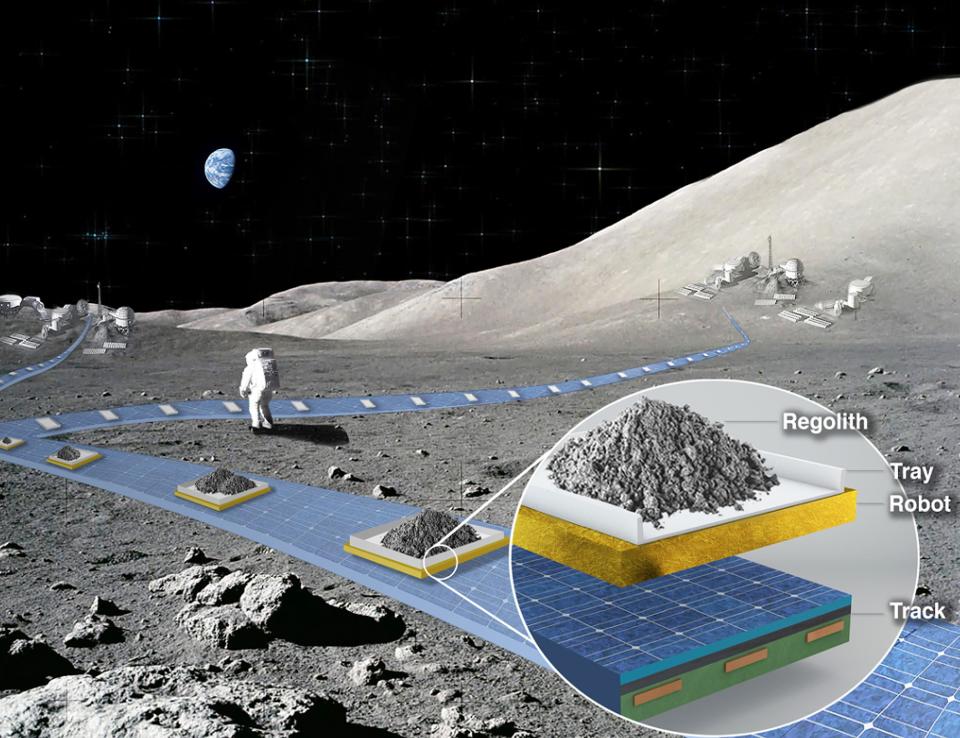All aboard the moon train: DARPA is trying to figure out how to build a lunar railroad
Astronauts could one day hop a train on the moon.
DARPA, the famed US research agency, has asked a firm to come up with a lunar railroad concept.
NASA wants astronauts to live on the moon, which means developing lunar power, transport, and comms.
Astronauts may one day be able to hop on a train to travel the moon's surface.
DARPA, the US Defense Department's secretive research agency, has been tasked with figuring out how to support astronauts who could soon be living on the moon for extended periods.
The plans are highly hypothetical — there are currently no permanent structures on the moon at all, and no people have been there since 1972.
But the US and other nations want to get people on the moon once again, and that would require futuristic infrastructure to provide reliable power, comms, and transport.
As part of this mission, DARPA tasked US aerospace and defense tech firm Northrop Grumman to develop a concept for a lunar railway.
If realized, this railroad could transport people, supplies, and commercial cargo on the moon, Northrop Grumman said in a statement Tuesday.
The firm will not be building the railway but figuring out if it is physically and financially possible.
They will have to find clever ideas to sidestep the moon's brutal landscape. Abrasive lunar dust, for one, can ruin tracks and transporters, NASA previously said.
NASA previously investigated a concept for a magnetic levitating train called FLOAT to avoid that problem. In that concept, electromagnetic tracks shuttled levitating robots carrying cargo back and forth.

The study found the concept was doable, but required more investigation, per Breaking Defense. It's not clear whether Northrop Grumman intends to pursue that idea or come up with something else.
Though this may all sound like science fiction, it's not as far-fetched as you might think.
NASA has a longterm plan underway to get people on the moon. The Artemis program kicked off with a flight around the moon in 2022.
Its ultimate aim is to establish astronauts on the moon and Mars, setting the groundwork for commercial exploitation of the solar system.
For the next Artemis mission, the agency aims to send astronauts back to the moon for the first time in over 50 years by the end of 2025.
Commercial partners, meanwhile, are already thinking of ways to mine the moon.
This could provide building materials, water that could be used to power rockets toward Mars, and Helium-3 — a precious isotope that could be used in fusion reactors.
NASA and other space agencies have also been looking at putting miniature nuclear reactors on the moon to power the bases. Plans also include putting comms and GPS satellites in the moon's orbit to allow astronauts to navigate, talk — and even stream — from the lunar surface.
Before this can happen, however, NASA needs to sort out the problem of getting astronauts to the moon from Earth. At this juncture, this depends on SpaceX and Blue Origins finessing their experimental mega-rockets.
Elon Musk's Starship last week passed a milestone when the almost 400-foot-tall rocket flew in space for the first time. Jeff Bezos's Blue Origin, for its part, aims to launch its behemoth New Glenn by the end of this year.
Read the original article on Business Insider


